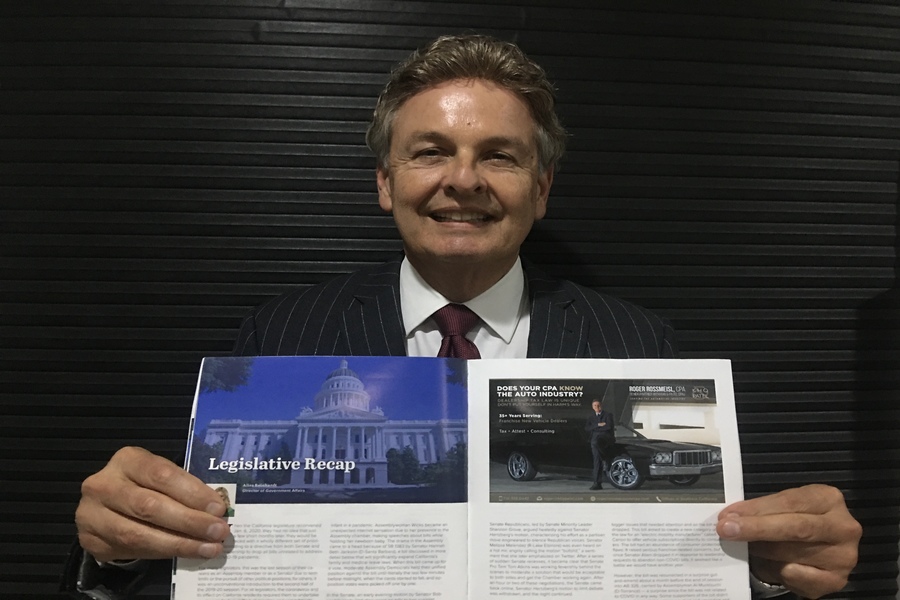Are you having difficulties understanding the passive activity rules? Are you wondering if the passive activity loss rules affect business ventures you’re engaged in — or might engage in? If the ventures are passive activities, the passive activity loss rules prevent you from deducting expenses that are generated by them in excess of their income. You can’t deduct the excess expenses (losses) against earned income or against other nonpassive income. Nonpassive income for this purpose includes interest, dividends, annuities, royalties, gains and losses from most property dispositions, and income from certain oil and gas property interests. So you can’t deduct passive losses against those income items either. Any losses that you can’t use aren’t lost. Instead, they’re carried forward, indefinitely, to tax years in which your passive...

(Run Time: 1 min, 40 sec) Working with a first-time auto dealer is an important job. One reason is because everything is new. Everything must be set up from scratch. I always say that it’s easier to do something right the first time than to have to fix it later. But you have to let me help . . . keep me in the loop. I had a dealership client once that was on the grow . . . purchasing a new dealership every year. The problem was that his attorney didn’t know dealerships, and I never heard about the transaction until it was consummated. The result? Every year, I spent a good amount of time figuring out how to undo errors in the business entity formations,...
(Run Time 1 min, 44 sec) When working with an existing dealer for the first time, the first step is to break everything down to the lowest common denominator, so-to-say. Each entity, and how these related companies interact with each other. Consider whether the interactions are arranged in a tax-wise manner. This has become even more important now in light of the recent Tax Cuts and Jobs Act. Heralded as containing the most sweeping changes in decades, new rules such as the 30% Business Interest Limitation and the 20% Qualified Business Income deduction have turned tax planning on it’s ear. Looking at everything with a new set of eyes can be very . . . well, eye-opening. The same goes for the dealership returns. At the end...
Do you buy or lease computer software to use in your business? Do you develop computer software for use in your business, or for sale or lease to others? Then you should be aware of the complex rules that apply to determine the tax rules for deducting software, whether you're buying, leasing or developing. Purchased software Some software costs are deemed to be costs of “purchased” software, meaning software that’s either: Non-customized software available to the general public under a non-exclusive license or Acquired from a contractor who is at economic risk should the software not perform. The entire cost of purchased software can be deducted in the year that it’s placed into service. The cases in which the costs are ineligible for this immediate write-off are the...
As posted to the Tony Seba YouTube Channel on 10/30/2019 (Run Time 31 min, 17 sec) Based on Tony Seba's #1 Amazon bestselling book "Clean Disruption of Energy and Transportation" and "Rethinking Transportation 2020-2030", this presentation lays out the key technologies (batteries, electric vehicles, autonomous vehicles), business model innovations (ride-hailing, transportation-as-a-service), how the technology disruption will affect existing companies and sectors (market trauma) and how it will unfold over the next decade, as well as key implications for society, finance, industry, cities, and infrastructure. (This is Blog Post #907) Tony Seba is the author of "Clean Disruption of Energy and Transportation - How Silicon Valley Will Make Oil, Nuclear, Natural Gas, Coal, Electric Utilities and Conventional Cars Obsolete by 2030" and "Rethinking Transportation 2020-2030". He is the creator of...
As posted to the Munro Live YouTube Channel on 10/9/2020 (Run Time 22 min, 38 sec) This video is an "abridged" version of a presentation given by legendary automotive engineer Sandy Munro in September, 2020. On Testa's growing lead in technology, Sandy comments, "It is not the big that eat the small, but rather the fast that eat the slow". (This is Blog Post #905) Sandy Munro is an automotive engineer who specializes in machine tools and manufacturing. He joined the Ford Motor Company in 1978 and then started his own consulting company, Munro & Associates, which specializes in lean design, tearing down automotive products to study and suggest improvements and innovations....
The business use of websites is widespread. But surprisingly, the IRS hasn’t yet issued formal guidance on when Internet website costs can be deducted. Fortunately, established rules that generally apply to the deductibility of business costs, and IRS guidance that applies to software costs, provide business taxpayers launching a website with some guidance as to the proper treatment of the costs. Hardware or software? Let’s start with the hardware you may need to operate a website. The costs involved fall under the standard rules for depreciable equipment. Specifically, once these assets are up and running, you can deduct 100% of the cost in the first year they’re placed in service (before 2023). This favorable treatment is allowed under the 100% first-year bonus depreciation break. In later years, you can...
I'm happy to report that my second ad has now been published in 2020 Issue 3 of the California New Car Dealers Association quarterly magazine, "California New Car Dealer Quarterly". (Run time 2 min, 0 sec) Whether you’re a successful General Manager that now finds him or herself a newly minted Dealer Principal seeking an Automobile Dealership CPA Firm . . . or a seasoned automotive veteran looking to make a change to an Automotive CPA that understands your business . . . we need to talk. I’m Roger Rossmeisl, a senior partner with Kho & Patel CPAs with offices in Southern California. For the past 35+ years my practice has been serving franchise new vehicle dealerships with their tax, attest and consulting needs. Today, an automotive-centric CPA is...
Business value is a function of risk and return. This is why, when appraising companies, valuation experts are always factoring fraud risk into a business valuation. Although valuations typically aren’t designed to unearth dishonest behavior, experts may expand the scope of their engagement if they spot something suspicious — particularly if they believe financial statements are inaccurate. Possible risks A valuator’s fraud risk assessment starts with the subject company’s internal controls. When interviewing management, experts ask about the business’s policies and procedures to protect assets, improve operating efficiency and ensure reliable financial statements. For example, they look for risk-reducing controls such as: Physical and digital controls (for example, locks, passwords, cameras and security systems), Fraud training programs, Job descriptions that call for segregation of duties and job...
You’re probably aware of the 100% bonus depreciation tax break that’s available for a wide range of qualifying property. Here are five key points about bonus depreciation to be aware of when it comes to this powerful tax-saving tool. Bonus depreciation is scheduled to phase out Under current law, 100% bonus depreciation will be phased out in steps for property placed in service in calendar years 2023 through 2027. Thus, an 80% rate will apply to property placed in service in 2023, 60% in 2024, 40% in 2025, and 20% in 2026, and a 0% rate will apply in 2027 and later years. For certain aircraft (generally, company planes) and for the pre-January 1, 2027 costs of certain property with a long production period, the phaseout...











